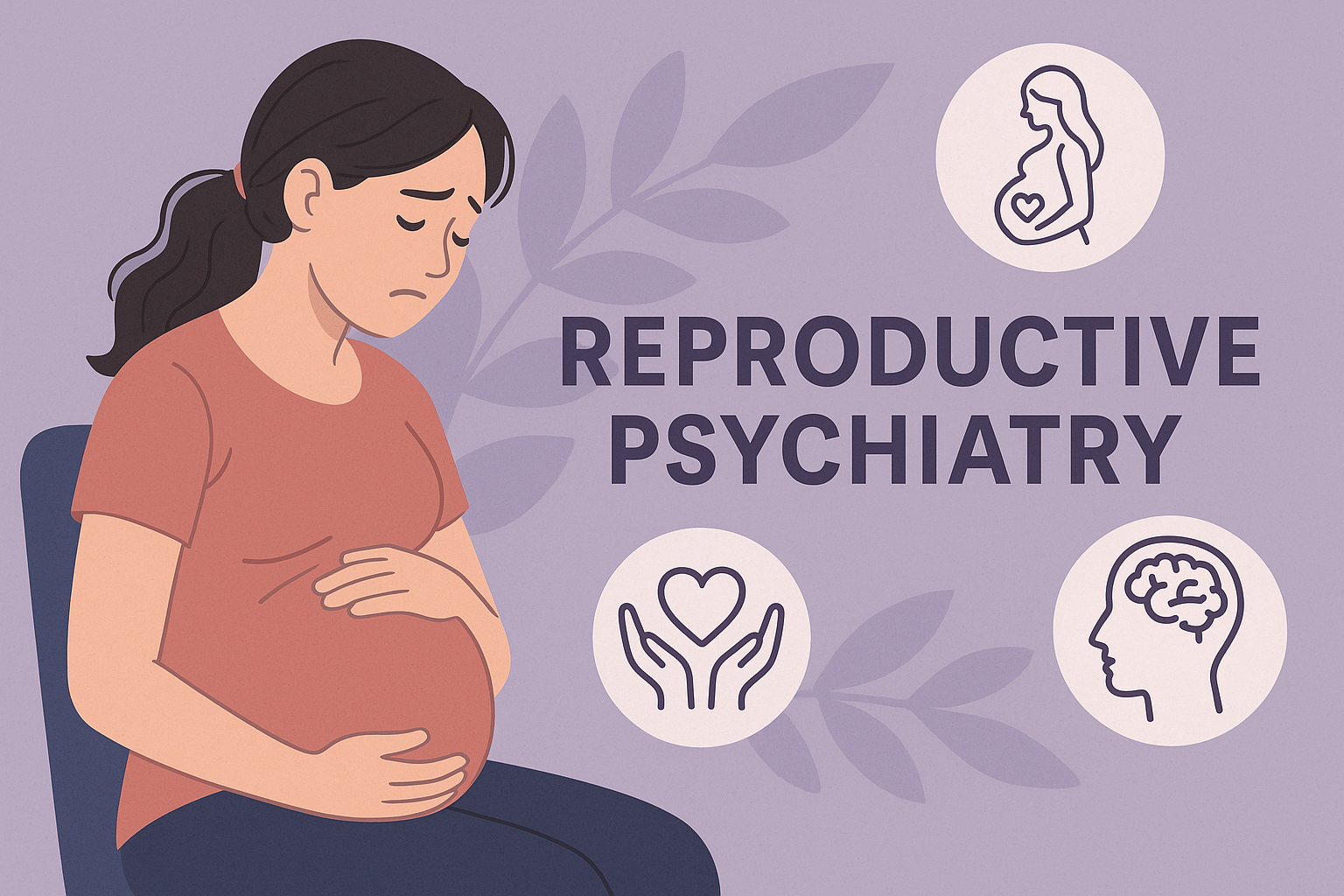Pregnancy is supposed to be a happy chapter. That’s the story most of us grew up hearing. In reality, it can be joyful and overwhelming, often in the same breath. Some women sail through with only fatigue. Others feel an unshakable weight press down before the baby even arrives.
The CDC found that about 13%, roughly one in eight women, experience depression during pregnancy. In a crowded prenatal clinic, out of every dozen women waiting, at least one may be silently struggling.
Reproductive psychiatry aims to understand how reproductive health and mental health intersect, and to offer care that fits the realities of pregnancy, postpartum, and beyond.
What Is Reproductive Psychiatry?
Reproductive psychiatry looks at mental health through the lens of reproductive milestones. That might mean supporting a teenager with PMS-linked mood swings, guiding a woman through pregnancy anxiety, or helping someone facing menopausal depression.
What sets it apart from general psychiatry is nuance. A reproductive psychiatrist knows how to weigh the risks and benefits of medication in pregnancy or breastfeeding. They build plans that work for both mother and baby.
And they rarely work alone. OB-GYNs, pediatricians, and primary care providers are usually part of the circle. If you’ve ever searched for a reproductive psychiatrist near you, this is the type of integrated, whole-family approach you’re hoping to find.
How Hormonal Changes Influence Mood
Hormones deserve more credit and blame than they usually get. During late pregnancy, levels of a calming compound called allopregnanolone (ALLO) climb high. ALLO interacts with brain receptors that help regulate stress. After delivery, ALLO plummets.
The NIH spotlighted this drop in 2024, linking it to postpartum mood swings. It’s one reason why women who felt balanced while pregnant can suddenly crash into anxiety or despair once the baby arrives.
That same biology led to new treatment breakthroughs. In August 2023, the FDA approved zuranolone, the first oral medication made for postpartum depression. Unlike traditional antidepressants that can take weeks, zuranolone works within days by targeting GABA receptors.
For many families, this was a turning point. Finally, there was medicine designed around the science of women’s mental health.
Common Conditions Addressed in Reproductive Psychiatry
Perinatal Depression
One of the most common pregnancy complications is not gestational diabetes or preeclampsia. It’s depression.
The signs may look like persistent sadness, irritability, or a sense of detachment from the baby. The risks are serious: preterm birth, bonding difficulties, and even maternal suicide. Talking about those risks feels heavy, but pretending they don’t exist is worse.
Perinatal Anxiety
Anxiety often flies under the radar. It’s easy to dismiss constant worry as “new mom nerves.”
However, panic attacks, racing thoughts, or sleepless nights, even when the baby is resting, tell a different story. Perinatal anxiety is common, often paired with depression, and it responds well to treatment when named early.
Bipolar Disorder and Postpartum Psychosis
Women with bipolar disorder face higher relapse risks postpartum. Careful planning can prevent crises.
The rare but dangerous postpartum psychosis appears in one or two women out of every thousand births. Symptoms include confusion, hallucinations, and delusions. Families often feel blindsided.
It is a psychiatric emergency that requires urgent intervention. This is where reproductive psychiatry can be lifesaving.
Why Early Support Matters
Early screening and counseling actually prevent many of these crises. ACOG recommends screening all pregnant and postpartum women for depression and anxiety, not just those who speak up. Quick questionnaires like the EPDS or PHQ-9 take minutes and save lives.
The U.S. Preventive Services Task Force reaffirmed that counseling, especially CBT or interpersonal therapy, reduces the chance of perinatal depression for women at risk. These are not abstract recommendations. They mean fewer nights of silent suffering, more secure attachments between mothers and infants, and lower rates of tragic outcomes.
The barrier is stigma. Too many women fear being judged as weak or unfit if they admit how they feel. This is where the link between gender and mental health is so visible. Society still expects women to smile through exhaustion. Reproductive psychiatry challenges that expectation, reframing help-seeking as a strength.
Treatment Options and What to Expect
Therapy often comes first. CBT and interpersonal therapy are proven to help women restructure anxious or negative thought patterns. Group therapy adds something extra, such as connection, validation, and the reminder that you’re not alone.
Of course, there is a role for medication as well. SSRIs are typically safe and effective. A reproductive psychiatrist helps families weigh the risks of treatment against the real risks of leaving a disorder untreated.
New treatments can offer new hope. Zuranolone, the new oral medication approved in 2023, works rapidly and can be lifesaving for patients who do not respond to conventional antidepressants. Brexanolone is an IV medication approved in 2019 and is available in certified clinics.
Practical Next Steps for Families
When is it time to seek help? If sadness, irritability, or anxiety linger for more than two weeks, that’s a sign. If bonding feels impossible or daily functioning slips, it’s time to talk to someone.
Certain symptoms require immediate action. Hallucinations, delusions, and thoughts of harming yourself or your baby are emergencies. Call 911, go to the ER, or get urgent psychiatric care.
For other support, families can lean on resources like the 988 Suicide & Crisis Lifeline or the National Maternal Mental Health Hotline (1-833-TLC-MAMA). Postpartum Support International also connects women to local providers and peer groups.
An initial visit is usually gentle: a screening questionnaire, an open conversation, and then a shared decision about therapy, medication, or both. Follow-ups track progress and adjust as needed.
Finding Strength in Support
Pregnancy and postpartum are complicated. They can be joyful, yes. They can also be disorienting, lonely, or frightening. Reproductive psychiatry exists because no one should have to face those challenges without help.
The conditions it addresses, such as depression in women, perinatal anxiety, and postpartum psychosis, are serious, but every one of them is treatable. Recognizing the role of hormones, the weight of social expectations, and the reality of gender and mental health gives us a fuller picture and reduces stigma.
At Zeam Health & Wellness, we have a focus on women’s mental health in Sacramento, Folsom, and Roseville. If you or someone you love is struggling, reach out. Together, we can deliver the care and support you deserve while pregnant, postpartum, and beyond.
Key Takeaways
- Reproductive psychiatry specializes in women’s mental health across reproductive milestones — from PMS and pregnancy to postpartum and menopause, integrating OB-GYN and psychiatric care for better outcomes. 【CDC†L103-L108】
- Perinatal depression is one of the most common pregnancy complications, affecting about 13% of women — early screening and counseling significantly reduce risks for both mother and baby. 【CDC†L103-L108】
- Hormonal shifts, particularly the drop in allopregnanolone after delivery, play a key role in postpartum mood disorders — leading to breakthroughs like zuranolone, the first FDA-approved oral treatment for postpartum depression. 【NIMH†L103-L108】【FDA†L103-L108】
- Perinatal anxiety, bipolar disorder, and postpartum psychosis require specialized management — the latter being a rare but life-threatening emergency that reproductive psychiatry is uniquely equipped to address. 【PMC†L103-L108】
- Treatment options include therapy, SSRIs, and new medications — CBT and interpersonal therapy are effective, while medications like zuranolone and brexanolone offer rapid relief for severe postpartum depression. 【NIMH†L103-L108】【FDA†L103-L108】
- Stigma remains the biggest barrier — many women fear judgment if they disclose struggles, but reproductive psychiatry reframes seeking help as strength, not weakness.
- Families should seek immediate help for severe symptoms — hallucinations, delusions, or suicidal thoughts are emergencies requiring urgent care. Support is available via the 988 Suicide & Crisis Lifeline and the National Maternal Mental Health Hotline (1-833-TLC-MAMA).




